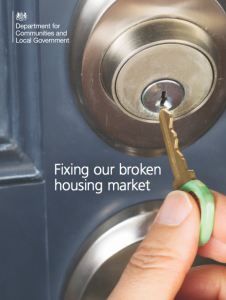
As the Greater Manchester Pension Fund steps up its direct investment in housing development, Kieran Quinn, chair of the fund, talks to Room151 about the need for central government to coordinate a single LGPS infrastructure pot before the momentum created by pooling is lost.

Room151: Tell us about the GMPF’s investments in housing.
Kieran Quinn (KQ): We’re expanding our direct investment in housing development. It’s an interesting time because there are councils on the one hand who need to develop their council tax receipts into the future through new homes and there are local government pension funds on the other hand who are looking for long-term investment opportunities that provide attractive blended returns. So we both have long-term objectives. Last week’s white paper reminded us of the chronic state housing is in, but this doesn’t need to be a crisis and I think LGPS funds can fundamentally contribute to the solution. Building on our Matrix 1 development we’re expecting to announce significant further development in the coming weeks.
Room151: Are you looking beyond the Manchester area for housing investments?
KQ: So far, outside of Manchester the initial (Matrix 1) model hasn’t taken off as a lot of the councils we’ve spoken to have wanted a capital receipt up front. That makes the calculations much more cumbersome. But we’re exploring different models and also through the Northern Pool I’m now looking beyond Greater Manchester for new housing opportunities.
The new approach we’ve developed for our Matrix 2 development should be a lot more user friendly for other authorities, at least that’s the expectation.
The other thing we’re open to is buying up land ourselves and then developing on it. I’m expecting the results of a report in the next couple of weeks and we’ll look at our options and take it from there. Like all investments, what we ultimately go for will depend on the returns we’re able to generate; it’s a commercial venture, but yes we’re not restricting ourselves geographically.
Room151: The government’s white paper on housing reiterated their wish to see more LGPS money go into housing. Is this all good news for you and the LGPS’s infrastructure ambitions?
KQ: It’s fairly typical of this government. They tell us what their aspirations are and what role they want us to play but then don’t tell us how we can actually play that role. That’s the frustration. I’ve always believed that housing is part of the overall infrastructure package anyway – that’s why Manchester has been doing it for so long – so we don’t need them to redefine what infrastructure is.

Government needs to give us a clearer understanding about the role they want us to play. We’ve all agreed in principle that there should be one infrastructure platform. It’s pointless if there are six or seven pools all chasing the same infrastructure investments because we know the first thing that’s going to happen is prices will go up. We need to establish this single platform.
My feeling is that government has backed off since last year when it was made clear to us that infrastructure needed to be a key part of our pooling submissions to government. But when the regulations finally came out the guidance (on infrastructure) was wishy-washy at best.
It’s all aspirational stuff but we need more. The fact is there are still significant parts of the LGPS that think infrastructure is too risky an investment. This is what pooling is supposed to resolve. The same applies to housing: if this is a national crisis why don’t we have a single national LGPS response to the crisis?
Room151: What sort of capacity have you got for further housing/infra investments?
KQ: It depends how you look at it. Our original deal with LPFA was for £500m. Then Lancashire, Merseyside and West Yorkshire came along we’re now suggesting that upwards of £1.2bn is available for infrastructure investment. We’ve still only invested about £450m so far, so that means we still have a substantial amount that we’re willing to invest, if the right deals are there for us.
And look, there is a platform available to all of us and it’s GLIL (LPP/Northern Pool infrastructure platform). The government now needs to be helpful. There are too many ad-hoc conversations going on across the LGPS but not enough coordination from government.
There needs to be a kind of clearing house approach where if a fund wants to be able to invest X in infrastructure and they want to see the schemes first, they can do that. But we need the Minister to step up and say to those who aren’t delivering on the higher level expectations of infrastructure, what they need to be doing. But he’s not, he’s just saying they need to do more and not what more looks like.
R151: Turning to your work with the LAPFF, is it becoming easier to exert influence over listed companies at least UK listed companies now that the government has begun to tackle corporate governance reform?
KQ: Oh far easier. The last 18 months have been quite momentous for LAPFF. Not only are we growing in membership but engagement is becoming far easier. I’ve seen a shift in corporate openness since the government started using the language it has done around corporate governance. That doesn’t mean they’re perfect or that we always get the answers we need but the change is welcome. I’ve had companies chase me over the last few months for meetings and that didn’t happen that often until recently.

R151: Some of the big fund managers have been getting a lot of press recently as they’ve upped their shareholder engagement. Does LAPFF have a job on its hands remaining relevant now that these big City institutions have come to the table?
KQ: Absolutely not. Actually, one of the biggest difficulties we’ve had over the years is getting certain asset management firms to take a more aggressive stand on some of these issues so we’re happy to see more voices raised and we see ourselves as a very good coordinating body. LAPFF has a unique approach to engagement but all engagement is good. What I would like to see now is some of these companies we’re hearing about taking their good words into the AGMs. We’ve had many private conversations over the years with asset management houses that agree with us in principle but don’t actually follow it up in the annual meetings.
LAPFF members have £180bn of assets under management so we’re a significant player.
R151: Are you concerned that Donald Trump is going to put paid to a lot of your good work with his plans for Dodd-Frank?
KQ: I’m no expert on Dodd-Frank but I think both political parties in America would accept that it needs reviewing. The problem is that Trump doesn’t want to review it he wants to fundamentally neuter it and yes, in my view, we do have some very difficult years ahead. That just means we need to be more coordinated in our efforts and so the asset management companies we mentioned before…their input is more relevant now than it’s ever been.
I’ve been quite impressed with some of the things our government has done around corporate governance, particularly when you consider where it gets some of its funding from, and the last thing I want to happen is for them all to disappear into dark holes again. I don’t have a crystal ball but potentially Trump is going to make it much harder for asset owners’ voices to be impactful. That doesn’t mean we don’t raise our voices though, it doesn’t mean we stop engaging and it doesn’t mean we don’t expose wrong doing in corporate boardrooms where we find it. It simply means that internationally we may need to coordinate our voices better.
Kieran Quinn is chair of the Greater Manchester Pension Fund and the Local Authority Pension Fund Forum. He was speaking to Peter Findlay.










